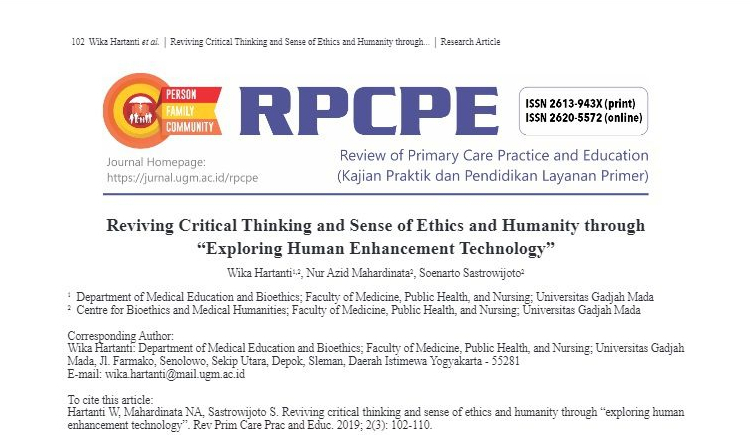Published Research
1.

Published at
Journal RPCPE (Review of Primary Care and Education)
Title
Reviving critical thinking and sense of ethics and humanity through “Exploring Human Enhancement Technology.”
Writers
Wika Hartanti(1*), Nurazid Mahardinata(2), Soenarto Sastrowijoto(3)
(1) Universitas Gadjah Mada
(2) Universitas Gadjah Mada
(3) Universitas Gadjah Mada
(*) Corresponding Author
Abstract
Background
The advancement of human enhancement technology (HET) has raised concerns among bioethicist due to its potential to undermine human nature. The existence and application of this technology in medical practice is inevitable facts which shifted medical practice. Medical education institutions have no choice except to prepare and equip future doctors with moral and ethical capacity to deal with this challenge, hence the development of this HET module.
Objective
Our study aimed to explore students’ perspectives and acceptance of the HET module.
Method
We asked students to write daily commentaries expressing their perspectives and acceptance throughout the module. Content analysis was performed on these textual data based on three main issues: (1) opinions on the module design (contents and methods); (2) reflections on overall learning experiences; and (3) applicability of the knowledge and skills. We analysed students’ grade to confirm achievements of learning objectives and effectivity of the module.
Results
A total of 78 medical students self-enrolled into this elective module in 2015 and 2016, and wrote daily commentaries posted online. Most students thought that the teaching methods were stimulating critical thinking, encouraging open-safe discussion, and sensitizing students to humanity issues. Topics related to ethics, humanities, and social sciences discussed were perceived as interesting and provided new perspectives. In overall reflection, students felt for the 1st time in medical school they had an enjoyable yet life-changing learning experience through this module. Students were inspired to use the knowledge and skills gained from this module to be better doctors, deliver comprehensive patient care, and contribute more to humanity. The LOs were well achieved as indicated with the students’ understanding of the HET concept and discourses, and their ability to show critical analysis, build and present logical-ethical arguments, and suggest a recommendation for better HET application in their group as well as individual works.
Conclusion
The module was delivered effectively and well accepted by the students. Most importantly, the module had successfully engaged students in various personalized form and influenced students’ positive transformation regarding personal, academic and professional commitments. The module showed potentials for further development and implementation as part of the mandatory medical curriculum.
Keywords
bioethics; human enhancement technology; humanities; medical education
